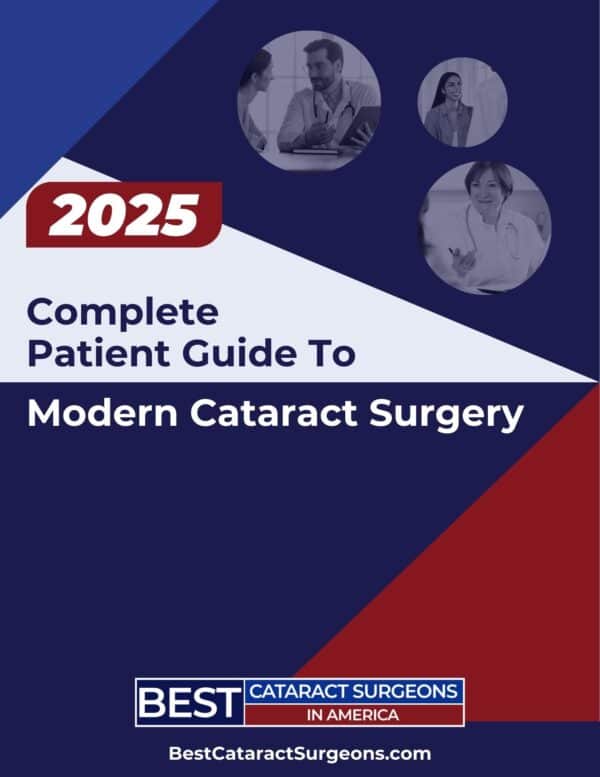Cataract surgery is a common and essential procedure for many Americans over the age of 55. If you’re among them, you might be wondering, “Is cataract surgery covered by health insurance?” At Best Cataract Surgeons, we’re committed to providing you with comprehensive, trustworthy information, so join us as we explore the ins and outs of this life-enhancing procedure’s financial aspects.
Wondering If Health Insurance Covers Cataract Surgery? The Answer Is Yes!
The definitive answer is yes, most health insurance plans cover cataract surgery when deemed medically necessary, and since cataracts have such a sharp impact on daily functioning, surgical intervention is a need rather than a want. The procedure’s outstanding 98% success rate, quick nature, and essential role in restoring quality of life for patients with vision impairment make it a prime candidate for insurance providers.
Types Of Insurance Coverage For Cataract Surgery
Our directory of board-certified cataract surgeons regularly works with patients using various insurance plans, such as:
- Medicare Coverage: Medicare Part B covers standard cataract surgery for qualifying individuals 65 and older, typically requiring the patient to meet their annual deductible and pay 20% coinsurance.
- Private Insurance Plans: Most employer-sponsored and individual health plans include cataract surgery coverage when medically indicated. Coverage levels and specific coinsurance or deductible amounts can vary, so it’s important to review your policy.
- Medicaid Programs: Does Medicaid cover cataract surgery? Yes, most state Medicaid programs, which provide coverage to low-income individuals and families, include cataract surgery as a covered benefit. As with all Medicaid benefits, specific eligibility and coverage details can vary by state.
- Federal Employee and Military Benefits: FEHB, TRICARE, and VA programs typically offer comprehensive coverage for qualifying beneficiaries, such as military personnel, veterans, and their families.
Note: laser cataract surgery is not covered by insurance.
What Exactly is Covered?
Insurance typically pays for traditional cataract surgery, which includes: pre-surgical consultations and diagnostic testing to ensure that you’re a good candidate for cataract surgery, standard cataract surgery with basic monofocal IOLs, the facility, anesthesia and procedure costs, as well as, the 90-day post-operative care period. Routine follow-ups to monitor healing, intraocular pressure, wound control, and pain management fall under the 90-day coverage.
Factors Influencing Your Out-of-Pocket Cost for Cataract Surgery With Health Insurance
While insurance usually covers a significant portion of cataract surgery costs, you may still encounter some out-of-pocket costs for cataract surgery with insurance. These costs depend on your specific insurance plan and choices made regarding the procedure.
Learn About Coinsurance, Copays, and Deductibles
- Deductibles. This is the amount you need to pay out-of-pocket before your insurance coverage kicks in.
- Copayments. A co-pay is a fixed fee you pay for the surgery or related appointments.
- Coinsurance. Some insurance plans have coinsurance, which is a percentage of the cost you’re responsible for after you’ve met your deductible.
Type of Intraocular Lens (IOL) and Cost of Cataract Surgery With Insurance
Another factor influencing your cost of cataract surgery with insurance is the type of intraocular lens (IOL) you choose.
- Standard IOLs are typically fully covered by insurance as they are considered medically necessary to restore vision after cataract removal.
- Premium IOLs, which offer advanced vision correction, may have additional costs not fully covered by insurance.
Always discuss what the best IOL options are for you with your surgeon, as they will clarify both the visual benefits and any potential cost of cataract surgery with insurance implications.
How Much Does Cataract Surgery Cost Without Insurance vs. With Insurance?
The cost of cataract surgery without insurance can range from $3,500 to $7,000 per eye. If you do have insurance, your out-of-pocket costs will be much lower and limited to your plan’s deductibles, copays, and/or coinsurance which is on average $200-$800 per eye. To get a clearer picture of the potential costs, there are a few steps you can take:
- Review Insurance Policy Documents. Access your plan details online or in the documents provided by your insurer. Look for your deductible, copay amounts for surgery or specialist visits, and coinsurance percentages.
- Get Pre-Authorization. Many insurance plans require pre-authorization before you can undergo cataract surgery. This process involves your surgeon’s office obtaining approval from your insurance company that the procedure is medically necessary.
- Contact Your Insurance Provider Directly. Call the member services number on your insurance card. Inquire specifically about your coverage for cataract surgery (CPT code 66984 is commonly used for standard cataract surgery). Ask about your out-of-pocket maximum for the year.
- Speak With the Cataract Surgery Center or Surgeon’s Office: The billing department of your chosen cataract surgeon can verify your insurance benefits and provide an estimate of your costs based on your plan and the planned procedure.
Find The Best Surgeon Near You Today With Best Cataract Surgeons
Don’t let insurance questions delay your journey to improved sight. Visit our Patient Resource Center for detailed information about modern-day cataract surgery, and if you’re ready to start your journey towards clearer sight, use our “Find a Surgeon” tool to connect with a top-rated, board-certified ophthalmologist in your area who can guide you through both the clinical and financial aspects of your care. Our network of specialists combines technical excellence with compassionate attention to ensure your cataract journey is smooth, successful, and tailored to your unique needs.











